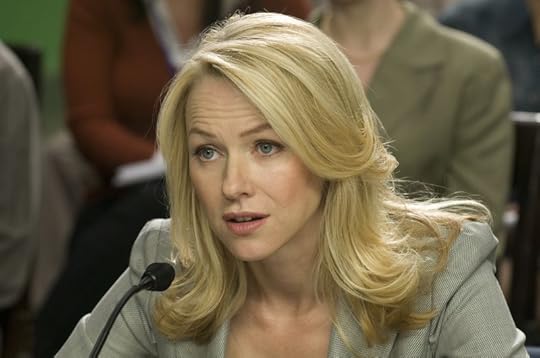Fair Game, or not so fair?
Not all the critics liked the new film Fair Game starring Naomi Watts and Sean Penn. My Daily Mail colleague Christopher Tookey gave it a severe pasting, saying :'It received rave reviews from critics in the U.S., who claimed it to be not only a triumphant mixture of the Bourne films and All The President's Men, but also a key political document. It promptly bombed at the box office.
'The people were right. This is a turgid thriller, indifferently directed by Doug Liman and sanctimoniously written by British brothers Jez and John-Henry Butterworth. Not even a heartfelt central performance by Naomi Watts can hide its lack of action and suspense.
It is also, despite its title, unfair. The less you know about the facts behind it, the more likely you are to swallow its wildly dishonest message. This hectoring film purports to tell the "true" story of how, in 2003, the name of CIA analyst Valerie Plame Wilson was leaked by George W. Bush's White House team.
The chief villains are Bush adviser Karl Rove (Adam leFevre) and Lewis 'Scooter' Libby (David Andrews), Vice-President Dick Cheney's Chief of Staff, who — according to the film — colluded to discredit her noble husband, former Ambassador Joe Wilson, played by Sean Penn.
There are so many distortions within the movie, but space does not allow me to recount them here. Suffice to say, whenever the Hollywood Left tries to sell you a conspiracy theory, it is a good idea to check the facts out yourself.'

But the Mail on Sunday's Matthew Bond took a strikingly different view : 'Fair Game is an impressive dramatisation of a true story. Naomi Watts plays Valerie Plame, the CIA spy whose diplomat husband, Joe Wilson (Sean Penn), was dispatched to Niger in 2002 to find out if the poverty-stricken African country had sold so-called uranium "yellowcake", a vital precursor to a nuclear bomb, to Saddam Hussein's Baghdad regime. Wilson, a former ambassador to Niger, definitively concluded it had not.
'This unwelcome finding goes down badly with White House hawks desperate to justify the looming invasion of Iraq and so, when Wilson further angers them by going public with his claims, they 'accidentally' blow his wife's cover.
Suddenly, every would-be terrorist and misguided American patriot knows exactly where at least one CIA spy lives.
It's a complicated tale, the content and characters of which won't be particularly familiar to British audiences.
But with Watts on convincing form and with Bourne Identity director Doug Liman driving things along, Fair Game is worth catching, despite its passing resemblance to Paul Greengrass's Green Zone and the rather tiresome over-indulging of Penn and his radical politics in the closing third.'
Jenny McCartney, in the Sunday Telegraph, gave it an interesting review and four stars. Philip French in 'The Observer' said it was 'a riveting conspiracy thriller in the class of All the President's Men, which in many ways it resembles.' He concluded: 'Although the outline of this story is well known, Fair Game gives it dramatic shape and teases out the moral problems raised. We are drawn into considering urgent questions that involve our society, the world in which we live, and the conduct of those still active on the political scene and benefiting from their murky association with events that have caused so much chaos and so many deaths.'
When such distinguished critics disagree, I tend to think the thing to do is to go and see for myself.
But I cannot. (Not in the way that Mr 'Bunker' 'cannot' believe in God, by which he means he has decided not to, but because it is physically extremely difficult for me to do so).
Fair Game was shown briefly in a late-night slot at my local multiplex, but never at a time when we could get a baby-sitter. If it was on anywhere else nearby, I've missed it, though lots of other unwatchable, patronising tosh was available. I like thrillers set in Washington DC because I once lived there, and it's my kind of thing. I'm also (like many others) quite interested in the story of a female spy apparently exposed by the powerful as revenge for her husband's whistleblowing.
Many of you will have seen the arresting Vanity Fair picture of Valerie Plame and her husband sitting in an open car, looking mysterious. Friends of mine in DC thought that Plame had been very badly treated. I agree with Christopher Tookey that it's always wise to check the facts (how couldn't I?) but in any case I'd like to form my own opinion as to whether the film is honest.
And the fact that a film bombs at the box office doesn't necessarily mean it's bad. We're not all teens on dates (I'm told that cinemas in the U.S. make more money from their vast buckets of popcorn and vats of fizzy drinks than they do out of the ticket price, and this could explain the aiming of films at the teen market and the increasing trend for tickets to be sold at the popcorn stand).
I would have liked to see this film on a proper screen in a proper cinema. Now I'll have to wait for the DVD and watch it as it was never meant to be seen, on a TV screen.
Peter Hitchens's Blog
- Peter Hitchens's profile
- 297 followers



